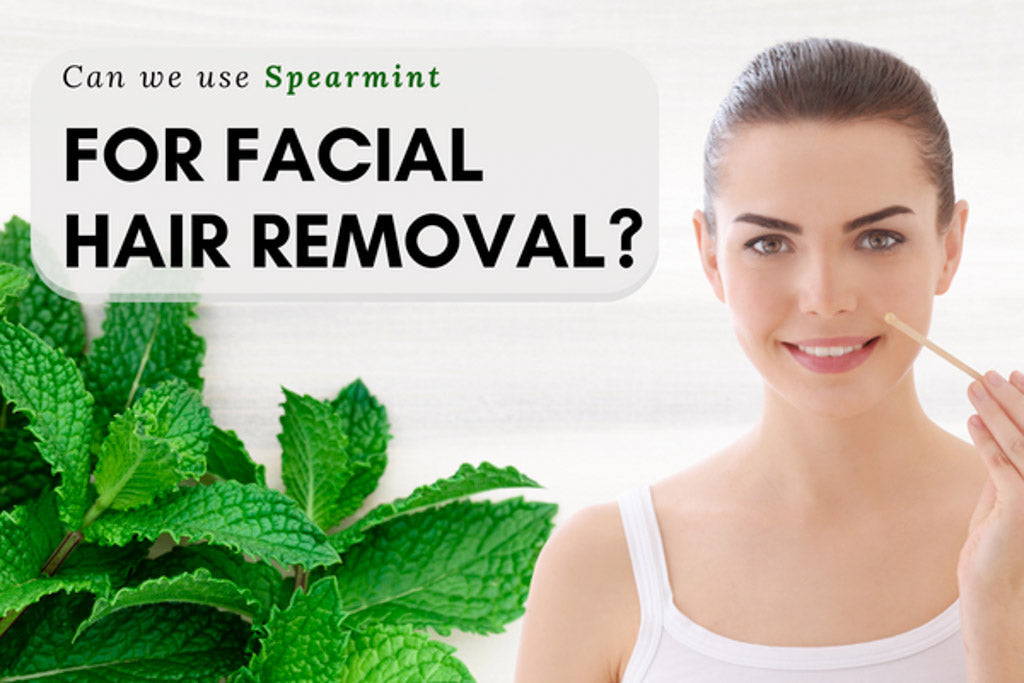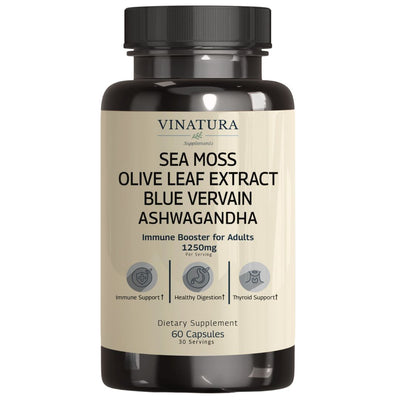
Can We Use Spearmint For Facial Hair Removal?
Facial hair has been a constant battle for many individuals, especially women. From waxing and threading to shaving and laser treatments, the quest for smooth, hair-free skin seems never-ending. However, there may be a natural solution hiding in your pantry – spearmint. With its refreshing aroma and cooling properties, spearmint has long been utilized for a variety of health benefits. But can we use spearmint for facial hair removal? In this blog post, we will delve into the science behind spearmint and explore its potential as an effective hair remover.
Before exploring further, please read the disclaimer located at the end of this webpage.
Can We Use Spearmint For Facial Hair Removal?

Before we dive into the details, let's first understand what spearmint is. Spearmint is a type of mint plant that belongs to the Lamiaceae family. It is commonly used in cooking and as a flavoring agent in drinks due to its refreshing taste.
However, Spearmint lower testosterone effects are well-known, as it has been used for centuries in traditional medicine for its medicinal properties. As a natural anti-androgen, spearmint has been found to reduce testosterone production in the body.
Based on recent studies, the consumption of 2 cups of spearmint tea daily has been found to potentially decrease testosterone levels and enhance the presence of crucial female hormones like luteinizing hormone (LH), follicle-stimulating hormone (FSH), and estradiol, which are vital for ovulation [1].
This can be particularly advantageous for women diagnosed with polycystic ovary syndrome (PCOS).
Furthermore, spearmint tea has demonstrated efficacy in reducing hirsutism, a prevalent condition among women [2]. Notably, this herbal remedy has gained popularity in Middle Eastern countries for the treatment of hirsutism.
You may also read: Benefits Of Spearmint For Hair & Scalp: Does Spearmint Block DHT?
How Does Spearmint Tea Help Reduce Facial Hair Growth Caused By PCOS?
Elevated levels of androgen hormone in the body have a strong correlation with excessive facial hair growth in women.
In a five-day study, 12 women diagnosed with polycystic ovary syndrome (PCOS) and 9 women experiencing unexplained facial hair growth were administered 2 cups of spearmint tea twice a day during the follicular phase of their menstrual cycle.
Although this study did not have sufficient duration to establish a direct impact of spearmint tea on facial hair growth, the findings indicated a reduction in testosterone levels among the female participants [3].
Another study, conducted over 30 days and involving 41 women with PCOS, demonstrated a decrease in facial hair density with the daily consumption of 2 cups of spearmint tea.
However, it should be noted that a 30-day timeframe might not be extensive enough to observe significant differences [4].
Spearmint tea can aid in reducing abnormal hair growth on the face by lowering androgens. Androgens, such as testosterone and DHEA, are usually not elevated in women.
However, in PCOS, women often experience elevated androgens, leading to symptoms like unwanted facial and chest hair growth, hair loss on the head, and acne.
You also read: Spearmint For PCOS: Benefits & How To Use Spearmint Tea?
Applying Your Spearmint Removal Treatment
Now that we know the potential of spearmint in reducing facial hair growth, let's discuss how we can use it as a removal treatment. The most common way to consume spearmint for hair removal is by drinking spearmint tea.
It is recommended to drink 2 cups of spearmint tea per day for at least 30 days to see visible results. However, it is important to keep in mind that this method may not work for everyone, as the effectiveness of herbal remedies can vary from person to person.
Another way to use spearmint for facial hair removal is by applying a topical solution. You can make a DIY spearmint oil mixed with carrier oils such as coconut or almond oil and massage it onto the affected areas. This can help reduce the growth of facial hair over time.

Other Spearmint Benefits
Good For the Digestive System
Spearmint is widely recognized for its digestive benefits. It is commonly used to alleviate digestive issues such as bloating, indigestion, nausea, and vomiting.
This is attributed to the presence of carvone, a compound known for effectively inhibiting muscle spasms in the digestive system. As a result, spearmint has gained popularity as an herbal remedy for improving digestive disorders.
In an 8-week study involving 32 participants diagnosed with irritable bowel syndrome (IBS), a group was provided with products containing spearmint, lemon oil, and coriander, in addition to loperamide for diarrhea or psyllium for constipation.
The study results demonstrated that the group using the supplement containing spearmint experienced significant improvements in abdominal pain, bloating, and discomfort compared to the placebo group.
Moreover, spearmint has also shown potential in reducing the feelings of nausea and vomiting induced by chemotherapy [5].
Explore more: Does Spearmint Help With Nausea?
Antioxidant
Antioxidants are natural compounds primarily found in plant species. They play a crucial role in protecting and repairing damage caused by free radicals, which are harmful molecules leading to oxidative stress.
This condition is associated with several chronic diseases, including cancer, cardiovascular disease, and diabetes.
Spearmint contains a significant amount of antioxidant compounds, such as flavones, rosmarinic acid, flavanones, and spearmint essential oil.
Just two tablespoons (11 grams) of spearmint provide approximately 2% of the Recommended Daily Intake (RDI) for vitamin C, which is another excellent antioxidant.
Moreover, scientists have discovered that spearmint extract can effectively inhibit the oxidation process of fat in meat, demonstrating comparable effectiveness to the synthetic antioxidant BHT [6].

Helps Improve Memory
There is evidence indicating that this herb may have potential in improving memory. Previous research in humans has shown that chewing spearmint-flavored gum can enhance memory.
In one study, older adults experiencing memory decline who supplemented with approximately 900 mg of spearmint extract per day demonstrated a 15% improvement in memory recall ability during tasks.
While the evidence regarding the benefits of spearmint for memory is still limited, it holds promise for individuals seeking to enhance memory, particularly among older adults [7].
Fight Bacterial Infections
Spearmint is extensively utilized in the manufacturing of toothpaste and chewing gum. Apart from delivering a refreshing breath, it possesses antibacterial properties that can effectively eliminate the bacteria responsible for bad breath.
Furthermore, studies have demonstrated its efficacy in combating foodborne pathogenic bacteria, including E. coli and Listeria [8].
Frequently Asked Questions
Are There Any Potential Side Effects Of Drinking Spearmint Tea?
While spearmint tea is generally considered safe for consumption, it can potentially cause side effects such as heartburn or allergic reactions in some individuals. It is always recommended to consult with a healthcare professional before incorporating any herbal remedy into your routine.
Can Men Also Drink Spearmint Tea For Excess Hair Growth?
Men can also benefit from using spearmint as a potential remedy for unwanted facial hair growth. However, it is important to note that the effectiveness of spearmint in reducing testosterone levels may vary from person to person.
Can I Drink Spearmint Tea Instead Of Taking Medication For PCOS?
While spearmint tea has shown potential in reducing excess hair growth in individuals with PCOS, it is not a substitute for medication. Spearmint can be used as a complementary treatment alongside medication prescribed by your doctor.
How Much Spearmint Should I Take For Hirsutism?
The recommended dose of spearmint for hirsutism is 2 cups of spearmint tea per day for at least 30 days.
How Long Does Spearmint Tea Take To Reduce Hair Growth?
The time it takes for spearmint tea to reduce hair growth may vary from person to person. Some individuals may see results in as little as 30 days, while others may take longer.
Conclusion
In conclusion, we can actually use spearmint for facial hair removal. In addition, Spearmint has a long history of use as a natural remedy for a wide range of health conditions. It has been known to assist with digestive issues and enhance memory, among many other potential benefits. However, it is recommended to consult with a healthcare professional before integrating any herbal remedy into your routine, particularly if you have existing medical conditions or are currently on medication.
Related Article:
Does spearmint dry up breast milk? From expert perspective
Does Spearmint Help With Headaches?
References
- [1] Akdoğan, M., Tamer, M. N., Cüre, E., Cüre, M. C., Köroğlu, B. K., & Delibaş, N. (2007). Effect of spearmint (Mentha spicata Labiatae) teas on androgen levels in women with hirsutism. Phytotherapy Research : PTR, 21(5), 444–447. https://doi.org/10.1002/ptr.2074
- [2] Grant, P. (2010). Spearmint herbal tea has significant anti-androgen effects in polycystic ovarian syndrome. A randomized controlled trial. Phytotherapy Research : PTR, 24(2), 186–188. https://doi.org/10.1002/ptr.2900
- [3] Akdoğan, M., Tamer, M. N., Cüre, E., Cüre, M. C., Köroğlu, B. K., & Delibaş, N. (2007). Effect of spearmint (Mentha spicata Labiatae) teas on androgen levels in women with hirsutism. Phytotherapy Research : PTR, 21(5), 444–447. https://doi.org/10.1002/ptr.2074
- [4] Mehraban, M., Jelodar, G., & Rahmanifar, F. (2020). A combination of spearmint and flaxseed extract improved endocrine and histomorphology of ovary in experimental PCOS. Journal of Ovarian Research, 13(1). https://doi.org/10.1186/s13048-020-00633-8
- [5] Mahendran, G., Verma, S. K., & Rahman, L.-U. (2021). The traditional uses, phytochemistry and pharmacology of spearmint (Mentha spicata L.): A review. Journal of Ethnopharmacology, 278, 114266. https://doi.org/10.1016/j.jep.2021.114266
- [6] Patra, N. K., & Kumar, B. (2006, January 1). 31 - Spearmint (K. V. Peter, Ed.). ScienceDirect; Woodhead Publishing. https://www.sciencedirect.com/science/article/abs/pii/B9781845690175500312
- [7] Hussain, A. I., Anwar, F., Shahid, M., Ashraf, M., & Przybylski, R. (2010). Chemical Composition, and Antioxidant and Antimicrobial Activities of Essential Oil of Spearmint (Mentha spicataL.) From Pakistan. Journal of Essential Oil Research, 22(1), 78–84. https://doi.org/10.1080/10412905.2010.9700269
- [8] Fletcher, R. S., Slimmon, T., McAuley, C. Y., & Kott, L. S. (2005). Heat stress reduces the accumulation of rosmarinic acid and the total antioxidant capacity in spearmint (Mentha spicata L). Journal of the Science of Food and Agriculture, 85(14), 2429–2436. https://doi.org/10.1002/jsfa.2270
Author

Product Disclaimer
Including an ingredient or study does not evaluate, endorse, or recommend any Vinatura product or any third-party product. Some ingredients discussed may not be used in any Vinatura product.
The content of the articles has not been evaluated by the Food and Drug Administration (FDA) and is not intended to promote or endorse any specific product. Any products sold on this website are not intended to diagnose, treat, cure, or prevent any disease.
Opinions and Endorsements
Any claims, statements, or opinions expressed in the articles are those of the author(s) and do not necessarily reflect the views or opinions of the manufacturers of the dietary supplement products. The products sold on this website are separate from the content of the articles and are not directly endorsed or associated with the information presented here.
Liability Disclaimer
The author(s) of the articles, website, and manufacturers of the dietary supplement products do not assume any liability for any potential consequences arising from the use of the information provided in the articles. Ingredient effects, dosages, and safety vary by individual, formulation, and context; some ingredients interact with medications or may be unsuitable during pregnancy or lactation. It is recommended that individuals consult with a qualified healthcare professional before making any dietary or lifestyle changes, including the use of dietary supplements.
Product Usage
Please refer to the product labels and packaging for specific usage instructions and guidelines for the dietary supplement products sold on this website.
Customer Support
For any concerns or questions regarding the dietary supplement products, please contact our customer support team, who will be more than happy to assist you.





Leave a Comment
Be the first to comment.
What do you think?